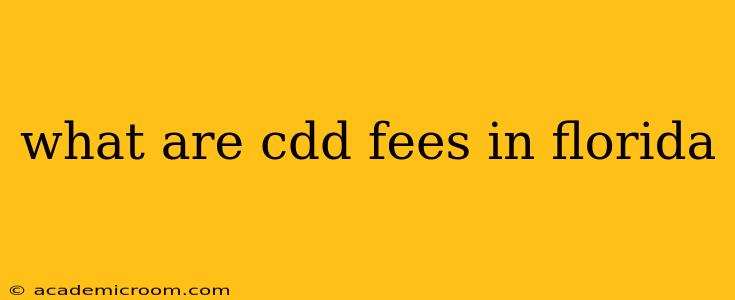CDD fees, or Community Development District fees, are common in Florida's master-planned communities. They're essentially property taxes levied to maintain and improve the amenities and infrastructure within these communities. Understanding these fees is crucial for anyone considering purchasing a home in a Florida community with a CDD. This article will explore CDD fees in detail, answering common questions and providing crucial information for prospective homeowners.
What exactly are Community Development Districts (CDDs)?
CDDs are special taxing districts created by the state of Florida. They are separate legal entities from the local government and are responsible for financing and maintaining infrastructure and amenities within a designated area, typically a large planned community. This infrastructure often includes:
- Roads: Construction, maintenance, and repair of roads within the CDD.
- Parks and Recreation: Development and upkeep of parks, playgrounds, recreational facilities, and landscaping.
- Water Management: Construction and maintenance of water and sewer systems, irrigation, and stormwater management.
- Security: Funding for security patrols or gated community maintenance.
- Other Amenities: This can include clubhouses, pools, fitness centers, and other community facilities.
Essentially, a CDD takes on the responsibility for managing and maintaining these aspects of the community, relieving the burden from the local county or municipality.
How are CDD fees assessed?
CDD fees are assessed annually as a special assessment on property taxes. Unlike regular property taxes, which fund general government services, CDD fees specifically fund the ongoing maintenance and improvement of the community's infrastructure and amenities within the designated CDD. The amount of the fee is determined by the CDD's budget and is typically included in your overall property tax bill.
Are CDD fees the same as HOA fees?
While both CDD fees and HOA fees contribute to the maintenance of a community, they are distinct:
- CDD Fees: Cover large-scale infrastructure and amenities that benefit the entire CDD area.
- HOA Fees: Cover the maintenance and upkeep of individual homeowner's properties and smaller, more localized amenities within a subdivision.
It's possible to have both CDD and HOA fees in a community. The CDD handles the broader infrastructure, while the HOA addresses individual home and neighborhood maintenance.
How long do I have to pay CDD fees?
The length of time you'll pay CDD fees depends on the specific CDD's debt schedule. CDD fees are often structured to pay off bonds used to finance the initial infrastructure development. Once the debt is paid off, the fees may decrease significantly or disappear altogether. However, some CDDs have ongoing operating expenses, meaning fees will continue, albeit usually at a lower rate, for maintenance and upkeep. It's crucial to review the CDD's financial documents to understand the projected timeframe for fee payments.
Where can I find information about CDD fees for a specific property?
Information regarding CDD fees for a particular property can be found through several channels:
- The Property Appraiser's Office: Your county's property appraiser's website typically provides detailed information on property taxes, including any CDD fees assessed.
- The CDD's Website: Many CDDs have their own websites with detailed financial information, including budget details and projected future fee schedules.
- Your Real Estate Agent: A knowledgeable real estate agent should be able to provide you with this information as part of the due diligence process.
- Title Company: The title company involved in your purchase will provide a final statement of closing costs, which includes CDD fees.
What happens if a CDD dissolves?
In the event that a CDD dissolves, the assets and responsibilities may be transferred to another governing body, such as the local municipality or county. The process is complex and involves legal considerations. The ownership and maintenance of infrastructure would be assumed by the new governing entity, and residents would likely see a change in how these services are funded.
Understanding CDD fees is essential when buying a home in a Florida community. By researching the specifics of a particular CDD and planning accordingly, prospective buyers can make informed decisions and avoid unexpected financial burdens. Remember to always ask questions and obtain clarification from your real estate agent, the CDD itself, or a qualified financial advisor to ensure you have a comprehensive understanding of the financial implications.
